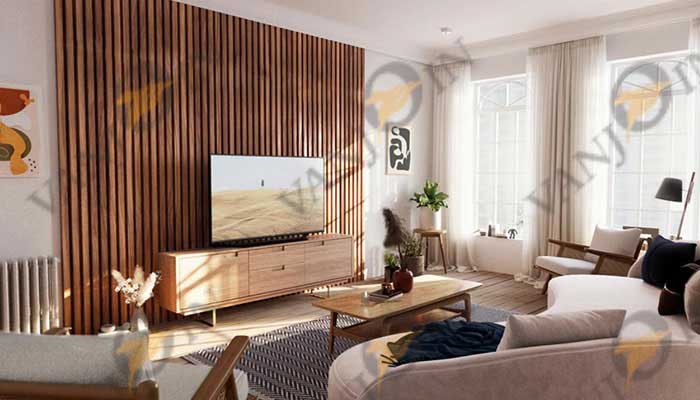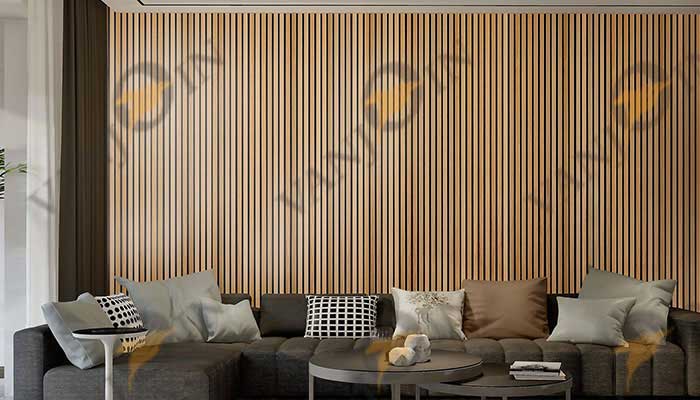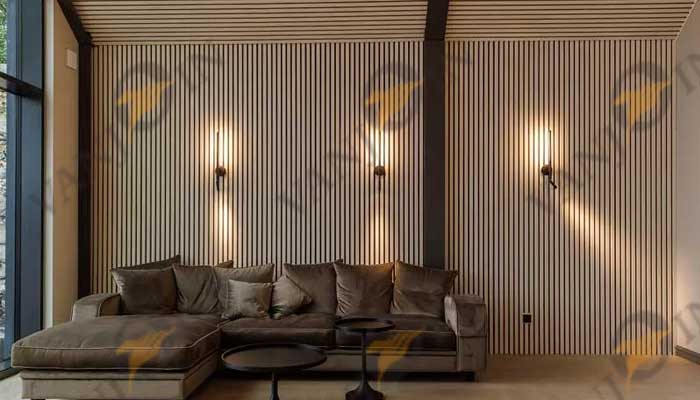Welcome to VANJOIN. Your satisfaction is our biggest pursuit.
WPC, or Wood-Plastic Composite, Acoustic Panels are a type of building material used for acoustic control and soundproofing in various environments. They are designed to provide both aesthetic appeal and effective sound absorption properties.

WPC (Wood Plastic Composite) wall panels and acoustic panels serve different purposes and have distinct characteristics. Let’s compare them in terms of their features:
Advantages:
1. Aesthetic Appeal: WPC wall panels often mimic the appearance of wood, providing a natural and aesthetically pleasing look.
2. Durable: WPC panels are resistant to rot, decay, and insects, making them durable and suitable for both indoor and outdoor applications.
3. Low Maintenance: Requires minimal maintenance, as it does not need painting or sealing, and is easy to clean.
4. Weather Resistance: Resistant to weather elements, making it suitable for exterior cladding.
Disadvantages:
1. Limited Sound Absorption: WPC panels are not designed for acoustic purposes, and they have limited sound absorption capabilities.
2. Cost: Depending on the quality and design, WPC panels can be relatively expensive compared to some alternatives.
Applications:
1. Exterior Cladding: Commonly used for the exterior cladding of buildings.
2. Interior Wall Covering: Suitable for interior wall applications where a wood-like appearance is desired.
Development Prospects:
The WPC industry in China is experiencing robust growth driven by the country’s emphasis on sustainable construction materials. With the increasing awareness of environmental issues, the demand for eco-friendly alternatives like WPC is on the rise. Chinese suppliers, including leaders like Vanjoin Group, is investing in research and development to enhance WPC technology, making it more competitive and versatile. As green building practices gain momentum, WPC wall panels are expected to see expanded applications in various construction projects, both domestically and internationally.

Acoustic Panel:
Advantages:
1. Sound Absorption: Acoustic panels are designed to absorb sound and improve acoustics in a space, reducing echoes and noise levels.
2. Versatility: Available in various designs, sizes, and materials, allowing for customization to suit specific acoustic requirements and aesthetic preferences.
3. Improved Speech Intelligibility: Enhances speech intelligibility in spaces by reducing background noise and reverberation.
4. Variety of Materials: Acoustic panels can be made from various materials, including fabric, foam, wood, or metal, offering flexibility in design.
Disadvantages:
1. Cost: Acoustic panels, especially high-performance ones, can be relatively expensive.
2. Aesthetics: Some acoustic panels may not have the same aesthetic appeal as decorative wall coverings like WPC panels.
Applications:
1. Theater Rooms: Used to enhance audio quality in home theaters.
2. Conference Rooms: Improves communication by reducing noise and improving sound clarity.
3. Offices: Creates a more comfortable and productive working environment by controlling noise levels.
4. Recording Studios: Essential for achieving optimal sound quality in recording spaces.
Development Prospects:
The acoustic panel market in China is witnessing significant growth as awareness of the importance of acoustics in various environments increases. Chinese suppliers are at the forefront of providing innovative and customized acoustic solutions. With the ongoing development of smart cities and the construction of modern buildings, the demand for acoustic comfort solutions is expected to surge. The Chinese acoustic panel industry is anticipated to evolve with advancements in sustainable and high-performance materials, catering to the diverse needs of commercial, residential, and industrial sectors.

Conclusion:
In summary, WPC wall panels are primarily used for decorative purposes and exterior cladding, while acoustic panels are specifically designed to improve sound absorption and control noise levels in indoor spaces. The choice between them depends on the specific needs of the project, with WPC panels suitable for aesthetic applications and acoustic panels necessary for addressing sound-related concerns.
Got a question, comment or business enquiry? We are always happy to hear from you.